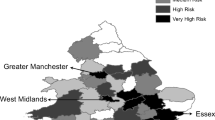Abstract
Mike Levi focusses on money laundering where he analyses why security experts should be interested in money laundering and its collateral damage both for companies and for society. It goes on to review how evidence has been used and can be used in fighting the financial components of underlying crimes, examining the range of the problem(s) we are supposed to be fighting—money laundering as an evil in itself and/or the underlying crimes which give rise to it; it estimates the size and harmfulness of the problems and identifies improvements/emerging problems in the assessment of money laundering and how it is combatted.
Access this chapter
Tax calculation will be finalised at checkout
Purchases are for personal use only
Similar content being viewed by others
References
Belton, Catherine. 2020. Putin’s People: How the KGB Took Back Russia and then Took on the West, London: William Collins.
Bowers, Simon. 2016. “How Mossack Fonseca helped hide millions from Britain’s biggest gold bullion robbery”. The Guardian, 4 April 2016. https://www.theguardian.com/news/2016/apr/04/brinks-mat-how-mossack-fonseca-helped-hide-millions.
De Boyrie, Maria E., Simon J. Pak, and John S. Zdanowicz. 2004. “Money laundering and income tax evasion: the determination of optimal audits and inspections to detect abnormal prices in international trade.” Journal of Financial Crime, 12 No. 2: 123–130.
Bullough, Oliver. 2019. Moneyland: Why Thieves and Crooks Now Rule The World And How To Take It Back. London: Profile Books.
FATF. 2018. Professional Money Laundering. Paris: Financial Action Task Force (FATF).
FATF/Egmont. 2020. Trade-based Money Laundering: Trends and Developments. Paris: FATF.
Ferwerda, Joras. 2013. The Effects of Money Laundering. Research Handbook on Money Laundering, Edward Elgar, 35–46.
Findley, Michael G., Daniel L. Nielson, and Jason C. Sharman. 2014. Global shell games: Experiments in transnational relations, crime, and terrorism. Cambridge University Press.
Gelemerova, Liliya Y. 2011. The anti-money laundering system in the context of globalisation. https://pure.uvt.nl/ws/portalfiles/portal/1383101/Gelemerova_anti_28-06-2011.pdf.
Grabosky, Peter N. 1995. ‘Counterproductive regulation’. International Journal of the Sociology of Law, 23 (4): 347–369.
Grossey, Susan. 2017. Anti-Money Laundering: What You Need to Know. CreateSpace Independent Publishing Platform.
HMG. 2020. National risk assessment of money laundering and terrorist financing 2020. https://www.gov.uk/government/publications/national-risk-assessment-of-money-laundering-and-terrorist-financing-2020.
Langworthy, Robert H. 1989. “Do stings control crime? An evaluation of a police fencing operation.” Justice Q 6(1):27–45
Levi, Michael. 1991. “Pecunia non olet: cleansing the money launderers from the Temple”, Crime, Law, and Social Change, 16: 217–302.
Levi, Michael. 2020. “Making sense of professional enablers’ involvement in laundering organized crime proceeds and of their regulation.” Trends in Organized Crime. https://doi.org/10.1007/s12117-020-09401-y.
Levi, Michael, Peter Reuter, and Terrence Halliday. 2018. “Can the AML/CTF System Be Evaluated Without Better Data?” Crime, Law and Social Change, 69(2): 307–328.
Levi, Michael and Melvin Soudijn. 2020. “Understanding the Laundering of Organized Crime Money. In P. Reuter and M Tonry (eds) Organizing Crime: Mafias, Markets, and Networks. Crime and Justice Vol 49. Chicago: University of Chicago Press.
Lord, Nicholas J., Liz J. Campbell, and Karin Van Wingerde. 2019. “Other people’s dirty money: professional intermediaries, market dynamics and the finances of white-collar, corporate and organized crimes.” The British Journal of Criminology 59, no. 5: 1217–1236.
McPherson, Gary. 2017. “Floating on Sea of Funny Money: An Analysis of Money Laundering through Miami Real Estate and the Federal Government’s Attempt to Stop It,” University of Miami Business Law Review 26, 1 (Winter): 159–190.
MacCoun, Rob and Peter Reuter, 2010. Drug War Heresies: Learning from Other Vices, Times, and Places. Cambridge University Press.
Madinger, John. 2012. Money Laundering: A Guide for Criminal Investigators. 3rd ed.. New York: Routledge.
May, Tiggey and Bina Bhardwa. 2018. Organised Crime Groups Involved in Fraud. London: Palgrave Pivot.
Middleton, David J., and Michael Levi. 2015. “Let Sleeping Lawyers Lie: Organized Crime, Lawyers and the Regulation of Legal Services.” British Journal of Criminology 55(4): 647–668.
OECD. 2020. Regulatory Impact Assessment. Paris: OECD.
Parkman, Tim. 2019. Mastering Anti-Money Laundering and Counter-Terrorist Financing: A compliance guide for practitioners, London: FT Publishing International. 2nd edition
Reuter, Peter. 2013. “Are estimates of the volume of money laundering either feasible or useful?.” In Research handbook on money laundering, edited by Brigitte Unger and Daan van der Linde. Cheltenham: Edward Elgar.
Sharman, Jason C. 2017. The Despot’s Guide to Wealth Management. Ithaca: Cornell University Press.
Teichmann, Fabian M., and Bruno S. Sergi. 2018. Compliance in Multinational Corporations: Business Risks in Bribery, Money Laundering, Terrorism Financing and Sanctions. Emerald Group Publishing.
UNODC. 2019. The World Drug Report 2019. https://wdr.unodc.org/wdr2019/prelaunch/WDR-2019-Methodology-FINAL.pdf.
Unger, Brigitte, and Daan Van der Linde, eds. (2013) Research handbook on money laundering. Edward Elgar Publishing.
Van Duyne, Petrus C., Jackie H. Harvey, and Liliya Y. Gelemerova. 2018. The Critical Handbook of Money Laundering: Policy, Analysis and Myths. London: Palgrave.
Vogel, Ben, and Jean-Baptiste Maillart, eds. 2020. National and International Anti-Money Laundering Law: Developing the Architecture of Criminal Justice, Regulatory Law and Data Protection. The Hague: Intersentia.
Young, Mary A., and Michael Woodiwiss. 2020. “A world fit for money laundering: the Atlantic alliance’s undermining of organized crime control.” Trends in Organized Crime. https://doi.org/10.1007/s12117-020-09386-8.
Wilkins, Leslie T. 1965. “New thinking in criminal statistics.” The Journal of Criminal Law, Criminology, and Police Science 56(3): 277–284.
Declarations
Funding: The author is grateful for the support of the UK Economic and Social Research Council PaCCS (Grants ES/S008853/1; RES-051-27-0208; and L216252037).
Author information
Authors and Affiliations
Corresponding author
Editor information
Editors and Affiliations
Rights and permissions
Copyright information
© 2022 The Author(s), under exclusive license to Springer Nature Switzerland AG
About this chapter
Cite this chapter
Levi, M. (2022). Combatting Money Laundering: Some Considerations for Security Professionals. In: Gill, M. (eds) The Handbook of Security. Palgrave Macmillan, Cham. https://doi.org/10.1007/978-3-030-91735-7_14
Download citation
DOI: https://doi.org/10.1007/978-3-030-91735-7_14
Published:
Publisher Name: Palgrave Macmillan, Cham
Print ISBN: 978-3-030-91734-0
Online ISBN: 978-3-030-91735-7
eBook Packages: Law and CriminologyLaw and Criminology (R0)




